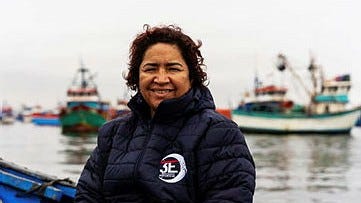The Humboldt squid, a vital resource for Peruvian fishermen, has become alarmingly scarce, crippling local economies and pushing communities into poverty. Elsa Vega, president of Sonapescal, a small-scale fishermen’s association, reports a complete standstill in catches this year. Fishermen are facing unprecedented hardship, unable to provide for their families and struggling with mounting debt. Vega notes that over 4,000 boats specializing in Humboldt squid fishing have been idle for months, leaving owners unable to meet loan obligations and maintain their vessels. This economic devastation extends beyond the fishermen themselves, impacting an entire production chain: dockworkers, stevedores, and fish factory employees are all out of work. Some fishermen have resorted to alternative livelihoods, driving motorcycle taxis, while others, desperately returning to the sea, are finding only minimal catches, insufficient to cover their costs.
The crisis has been exacerbated by the perceived inaction of Peruvian authorities in addressing the alleged overfishing by the Chinese industrial fishing fleet. During a recent state visit by Chinese President Xi Jinping, Peruvian fishermen staged protests, accusing the Chinese fleet of illegal, unregulated, and unreported fishing. Their pleas, however, seemed to fall on deaf ears. Vega describes a chaotic situation where Peruvian fishermen, struggling for survival, feel unheard and ignored. She emphasizes the unjust competition faced by local fishermen against a massive, industrial-scale fleet that seemingly operates with impunity. The Chinese presence in Peruvian waters has been noted since 2001, with complaints escalating from 2016. Despite numerous reports filed with authorities over the past two years, no significant action has been taken. Vega expresses outrage at the apparent disregard for local livelihoods and the blatant disregard for regulations by the Chinese vessels.
Adding to the frustration is the perceived lack of transparency from the Chinese fleet. Vega accuses the Chinese vessels of refusing to install the Sisesat satellite tracking system, a crucial tool for monitoring fishing activity and preventing illegal practices. This lack of cooperation fuels suspicions and hinders efforts to regulate fishing activities and ensure sustainable resource management. While Chinese officials and companies maintain their adherence to existing regulations, the reality on the ground starkly contradicts these claims. The continued presence of large Chinese fishing fleets, coupled with dwindling catches for Peruvian fishermen, paints a picture of unchecked exploitation and a disregard for the long-term health of the Humboldt squid population.
The decline of the Humboldt squid is not only an economic disaster for Peru but also a significant ecological concern. The Humboldt squid, which can reach lengths of two meters and weigh up to 50 kilograms, plays a crucial role in the marine ecosystem. While sensitive to temperature fluctuations, biologist Juan Carlos Riveros, scientific director of the Peruvian branch of Oceana, pinpoints overfishing as the primary driver of the population decline off the Peruvian coast. The species’ lifecycle and behavior, involving deep-water dwelling during the day and surface hunting at night, further increases its vulnerability to industrialized fishing practices. The drastic reduction in squid numbers threatens to disrupt the delicate balance of the marine food web and has long-term implications for the health of the ocean.
The situation highlights the complex challenges of managing shared marine resources and the urgent need for international cooperation to combat illegal fishing. The plight of the Peruvian fishermen underscores the devastating consequences of unregulated fishing practices, both economically and ecologically. The lack of effective enforcement and the seeming impunity enjoyed by large fleets operating illegally threaten the livelihoods of communities dependent on fishing and jeopardize the future of vital marine resources. The urgent need for transparency, accountability, and effective regulation is paramount to ensuring the sustainability of fisheries and protecting the livelihoods of those who depend on them.
Moving forward, addressing the crisis requires a multi-pronged approach. Firstly, the Peruvian government must prioritize the concerns of its own fishermen and strengthen its enforcement capabilities to curtail illegal fishing activities within its Exclusive Economic Zone. This includes robust monitoring and control mechanisms, as well as stricter penalties for violations. Secondly, there is a critical need for international collaboration to address the issue of illegal, unregulated, and unreported fishing. This requires enhanced cooperation between nations, sharing of information, and the development of effective international frameworks for monitoring and regulating fishing activities on the high seas. Finally, promoting sustainable fishing practices is crucial for the long-term health of the Humboldt squid population. This involves establishing catch limits based on scientific data, implementing closed seasons to allow for stock replenishment, and encouraging the use of selective fishing gear to minimize bycatch and protect other marine species. Only through concerted efforts can we ensure the survival of this vital resource and safeguard the livelihoods of the communities that depend on it.














